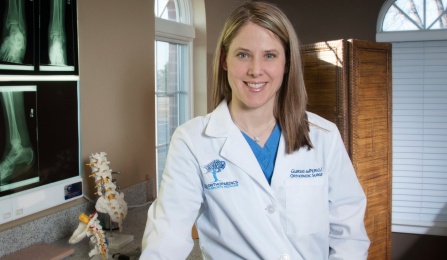Jennifer Gurske-dePerio

Jennifer Gurske-dePerio and two other women shook up things in the summer of 2005 when they earned three out of four of the highly coveted residency slots in UB’s Department of Orthopaedics.
At the time, a national advocate for women in orthopaedics had heard of only one other instance of such a female majority occurring, due largely to a widely held belief that “you have to be a 300-pound linebacker” to tackle the rigors of the profession.
Well, Gurske-dePerio, now entering her third year of practice, is treating linebackers and other Buffalo Bills players at the UBMD Orthopaedics & Sports Medicine office located across from Ralph Wilson Stadium. In addition to professional athletes, she also sees a steady stream of patients of all ages and backgrounds.
As an orthopaedic surgeon Gurske-dePerio’s primary areas of expertise are foot and ankle injuries, but she is also proficient in trauma, wound care and general orthopaedics, applying her skills at several area hospitals.
An athletic student growing up in Rochester, N.Y., Gurske-dePerio came to Buffalo in 1995 to train in physical therapy, which she now incorporates into her patient care.
She credits many of her exceptional opportunities at UB to the support she received from Lawrence Bone, MD, recently retired chair of the Department of Orthopaedics. Bone encouraged her to enter medical school and then championed her determination to buck the odds of women in the field of orthopaedic surgery.
In 2011, Gurske-dePerio completed fellowship training at the Florida Orthopaedic Institute, after which she returned to Buffalo to join the faculty at UB, where she embraces her role as clinical assistant professor.
“I can still make a difference educating the next line of orthopaedic surgeons or doctors of any discipline,” she says. “Community practice is so very important but it’s nice to stay active in the academic circle.”
And, yes, among those whom she teaches are women residents and medical students. “I’ve had the unique opportunity to encourage them to go into orthopaedics and they have,” she notes. “It’s important to pass on the belief that you can do this.”
